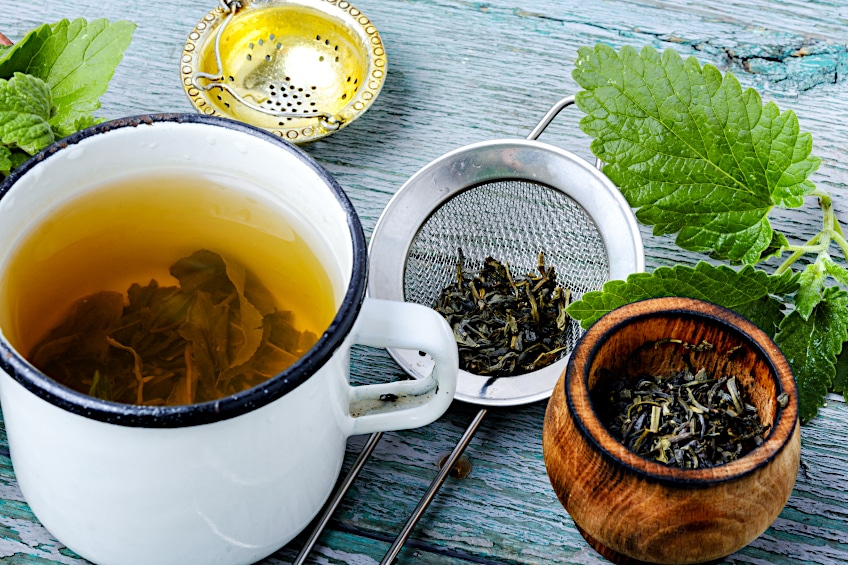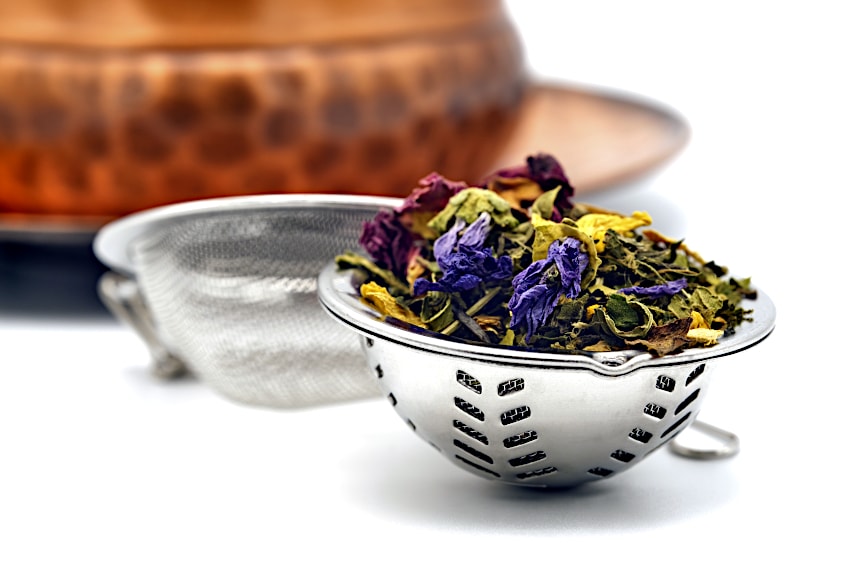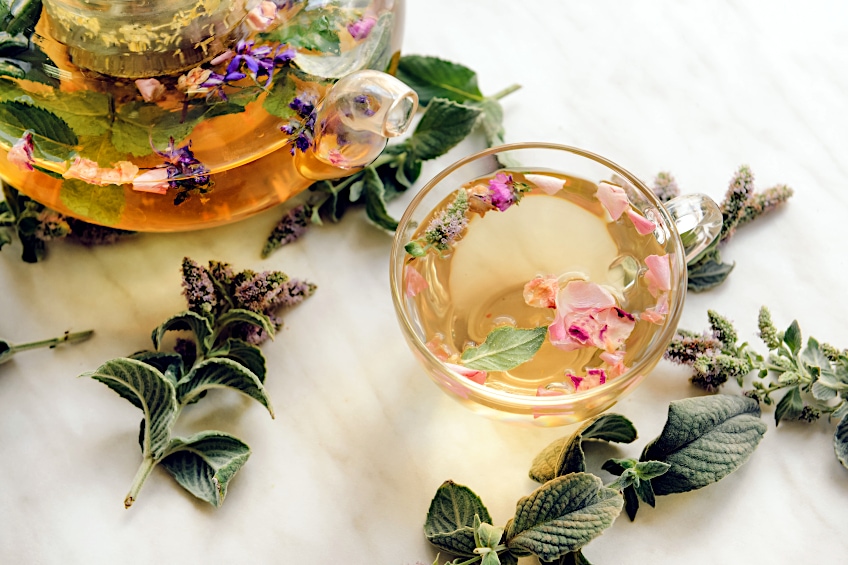Herbal tea blends are enjoyed by many people for their distinctive flavors and plentiful health benefits. Not only can you grow and harvest your own herbal tea mix at home, but you can also create a multitude of Herbal tea blend recipes out of just a few garden-grown ingredients. By growing and selecting your own herbs for tea blends, you can experiment with various combinations and create your own herbal tea recipes too!
Herbal Tea Recipes to Enjoy at Home
Many people love to grow various herbs in their gardens at home. Yet, once they are growing, it is essential to know when to harvest your herbs for tea blends, and how to prepare your homemade tea. You might find that certain herbs are not really that flavorful on their own, and therefore to get the most out of them, it helps to make herbal-blend tea out of several herbs at once. Combining herbs for tea blends takes a bit of practice but you’ll soon gain a sense of which herbs mix well together.

What Is Required to Make an Herbal-Blend Tea?
If you have a few different varieties of herbs available, you may easily make your own herbal tea mix. Many retail mixtures include artificial components, as well as sweeteners. They may also be extremely stale and old or produced with low-quality herbs. Creating herbal tea blends yourself is easier, more fun, and more affordable than buying from a store. Besides your preferred herbs for tea blends, you will also require a few mason jars, as well as a tea strainer. Another useful thing to add to your list is labels, just in case you would like to keep track of which herbs are in which jar.

After combining, keep your herbal tea blends in jars, being careful to properly seal them. You can keep your herbal tea mix in a cool and darkish spot for up to a year; it will not go stale after that, although the tastes may become less pronounced. If this occurs and you don’t want to just throw them out, you may spice them up with a wedge of fresh lemon or even a piece of ginger. If your own home garden doesn’t produce all of the various herbs you want in your herbal tea recipes, there are many companies that offer herbs in quantity.
Keep in mind, that although we refer to these tea blend recipes as herbal, they don’t have to consist exclusively of herbs.
Our Favorite Herbal Tea Recipes
Some herbs are said to provide health advantages, but they don’t always taste very good. That is why we choose to combine them when making our own homemade tea! It’s all about knowing which herbs may be used to cover less palatable flavors, what amount to use to prevent bitterness, which herbs work as a foundation, and which should only be employed as an accent flavor. You will find that the mellower herbs work better as base ingredients in your herbal-blend tea, such as mint, lemon balm, nettle, and rooibos.

Other herbs work better as a star ingredient in your herbal tea recipes, such as valerian, rosemary, or thyme. And then there are spices that can accent flavor to your tea blend recipes, such as ginger, cinnamon, and fennel seed. However, these herbal tea mix ideas are just a few examples, since there are far too many herbs available to put in your herbal tea blend recipes to even consider naming them all. If you’re not sure about the taste of an ingredient, you may always prepare a standalone tea with it as a tester.
Mint Tea
Mint tea is made with only two ingredients: fresh water and a few mint leaves! You’ll be surprised at how much taste comes from only two simple ingredients. Mint is believed to have medical properties such as relieving headaches, calming upset stomachs, and increasing energy.
- First, you will need to boil a pot of water and then add around eight freshly picked mint leaves.
- Pour the water into a cup with the leaves and let it simmer for about five minutes before serving.
If you want to enjoy the undisputed champion of mint teas, then you can try your hand at making the world-famous Moroccan mint tea.
Thyme Tea
Thyme lends a warm and delightful herby appeal. This tea is best made in the summer when you have plenty of herbs growing. Thyme has medicinal benefits such as aiding digestion and easing a sore throat.
- Start by boiling a pot of water for your thyme tea.
- Pick around 10 fresh sprigs of thyme and place them in a cup.
- Add the water once boiled and drink after about five minutes of letting it simmer.
Ginger Tea
Ginger root has been used medicinally for millennia. Traditionally, ginger has been utilized to treat nausea and digestive issues. It also contains important phytonutrients, which may promote a healthy biome.
- Peel and grate some fresh ginger, placing it into a strainer when done.
- Fill a cup with boiled water and set it aside for approximately five minutes.
- Honey is essential for bringing out all of the amazing ginger taste.
- Squirt in some lemon juice as well if you like.
Oregano Tea
Fresh oregano has been shown to have anti-bacterial, anti-cancer, and anti-inflammatory effects. So, it’s conceivable that oregano tea has the same effect! While oregano is primarily recognized for its use in Italian cooking, its taste adds complexity to homemade tea.
- Fill a pot of water and allow it to come to a boil.
- Place a couple of big sprigs of leafy oregano into a cup, fresh or dried.
- Add the water and allow it to stand for around five minutes before serving.
Lavender Tea
This calming herbal tea has a subtle flowery flavor and may have health advantages. This tea is not overpowering, and it has just enough lavender to provide a faint flowery taste towards the end of each cup. According to some research, lavender tea can aid with digestive difficulties such as upset stomach, and nausea.
- Place some fresh or dried lavender into a strainer.
- After filling a cup with hot water, add the strainer.
- To get the most out of lavender tea, add some honey for sweetness.
Sage Tea
The taste of sage tea is just what you’d expect: warm and piney! It’s wonderfully amazing with a bit of sugar and citrus to round out the taste. Sage is recognized to offer anti-cancer qualities as well as improved memory and skin health.
- Pick two fresh sage sprigs from your garden and add the sprigs to a cup of boiled water.
- A bit of lemon juice and honey work well to bring out the sage tea flavor.
Rosemary Tea
Rosemary tea has a refreshing, piney aroma. Fresh rosemary has been shown to help with blood sugar control, mood enhancement, and digestion.
- Pick a couple of fresh rosemary sprigs from your garden and add them to a cup of steaming hot water.
- Try adding agave or lemon, as rosemary on its own is quite overpowering for most people.
Turmeric Lemon Tea
This drink is meant to boost immunity when one is feeling under the weather. It is also considered to be beneficial for detoxifying the system and relieving achy joint symptoms in arthritis patients.
- Place half a teaspoon of turmeric powder and a quarter teaspoon of pepper into a mug.
- Then add hot water along with honey and some lemon juice, depending on your preference.
Ashwagandha Tea
Ashwagandha is said to be a miraculous plant that boosts the immune system, stabilizes blood sugar levels, and decreases stress and anxiety.
- Rinse and boil the Ashwagandha root in water for about 15 minutes before you strain the liquid into a cup and allow to simmer.
- Adding honey is recommended for sweetness and taste.
Holy Basil Tea
Holy basil or Tulsi is an excellent herb. It not only helps to boost your immunity and fight infections, but it also helps repair a variety of skin conditions. It also appears to help with diabetic issues, assisting to maintain blood sugar levels.
- Add a quarter cup of Tulsi leaves to a cup of water and allow to boil and then let it sit on a very low flame for around 15 minutes.
- Strain the liquid into a mug and add a little lemon juice and honey.
Chamomile and Lemon Balm Tea
When two wonderful herbs with soothing characteristics are combined, you get the ultimate delectable sleep time tea ever. Lemon balm is a mint family plant with a moderate mint and lemony taste. It complements the delicate floral taste of chamomile.
- Blend one spoon of dry chamomile flowers with a spoon of crushed dry lemon balm leaves.
- Add the herbs to boiling water and allow to cool before serving.
You can even add another herb to your mix, like mint for some extra zing, if you’d like.
Herbal Chai Tea
Nothing beats a nice cup of chai in any season. While traditional chai is produced with black tea, there is no caffeine in herbal chai which is made with Rooibos tea, which just happens to be one of the healthies teas on the planet. This warming and calming beverage can be made with either crushed or powdered herbs.
- Make a blend of rooibos tea with a teaspoon of fresh ginger or dried ginger powder.
- Add crushed cinnamon and half a teaspoon of crushed cardamom.
- A teaspoon of cloves should also be added before boiling.
Apple and Cinnamon Tea
Apple and cinnamon tea is a real classic among herbal blend teas. They may be made using cinnamon powder, as well as raw or dried apple bits. A fruit drying machine might be useful for preparing the greatest homemade tea.
- Make a blend of half a spoon of crushed cinnamon with one spoon of pieces of dried apple.
- Next, steep in a cup of boiled water and allow to rest for a few minutes before consuming.
Cardamom Ginger Chai Tea
If you want spicy, herbal tea, then cardamom ginger chai tea is for you. Cardamom oils, seeds, and extracts are regarded to have powerful medicinal effects and have been utilized for generations in traditional medicine.
- To obtain that delicious chai flavor, steep the loose black tea with sugar, grated ginger, and cardamom.
- The milk is then added to make it richer and creamier.
Clove and Cinnamon Tea with Orange
Cloves and Cinnamon are a dynamite combination of good stuff. Every cup of this this tea is filled to the brim with vitamins and infection-fighting properties. It is also very good for warding off diabetes.
- Add some cinnamon and orange to a cup of boiled water.
- Add some cloves and allow to simmer before serving.
Immuni-Tea
This recipe contains traditional immune-boosting components that are high in vitamins and antioxidants. It makes an excellent hot drink throughout the chilly flu seasons.
- You will need equal parts elderflowers, rose hips, echinacea, chamomile, and elderberries.
- Simply combine all of the herbs and preserve them in an airtight jar. To prepare, simmer one teaspoon of the herbal tea mix in boiling water for around 20 minutes with a tea ball.
Tranquili-Tea
As the name implies, this one is great for soothing and relaxing. Consider giving it to your family before bedtime to aid sleep.
- You will need two parts lemongrass, as well as two parts rose petals, and four parts chamomile.
- Mix the ingredients in a glass container to blend them fully.
- Add one teaspoon of the mix to some boiling water and steep for about 10 minutes.
- Serve with some honey for sweetness and taste.
Pregnan-Tea
During pregnancy, some people consume a particular tea that helps with nausea and intestinal issues while also strengthening the uterus. The nettle also contains Vitamin K, which is necessary during pregnancy and delivery to aid with clotting.
- Mix four cups of raspberry leaf, a quarter cup of stevia leaf, one cup of nettle, and half a cup of mint.
- You will only need one tablespoon of this blend per cup, so keep this in mind when creating your brew.
Herbal Tummy Soother
This tea is highly soothing for stomach problems or individuals who are prone to digestive issues. The recipe is also simple:
- Blend two teaspoons of mint with half a teaspoon of fennel seeds and a small pinch of optional dried ginger.
- Pour one cup of hot water over the blend, then cover and simmer for 5 minutes before serving.
Herbs for tea blends can be easily grown in the privacy and comfort of your own garden. There are many wonderful herbal tea recipes to choose from that we have included helping you get started with your own herbal tea blends. However, it is always good to experiment, and we suggest creating your own herbal tea blend recipes by blending unique mixes of your favorite herbs.
Frequently Asked Questions
Where Can I Get Herbs for Tea Blends?
There are two potential ways for you to get herbs for tea blends. You can either go to a specialist store or market and purchase them there, or you can grow your own. In the long run, it is far more satisfying to grow your own herbal tea mix.
What Are the Benefits of Herbal-Blend Tea?
It all depends on which herbs you use. Every herb has unique medicinal properties that can provide relief for a large range of illnesses, from blood pressure to insomnia, to stress, and a weak immune system. Choose your herbs based on what you would personally like to heal in your body, or simply enjoy it for the refreshingly wonderful flavors.
The post Herbal Tea Recipes – Healthy Homemade Teas from Herbs appeared first on Natural Herbal Living.

